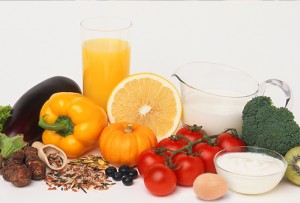(ThyBlackMan.com) We know what you’re thinking. “What?! Avoid healthy foods?”
Yep, you heard us. Now, of course, we don’t mean all healthy foods (as if we’d let you off the hook that easily). Instead, recent studies by food industry experts have targeted a few foods that, while they certainly have healthier reputations, are potentially hazardous because of the ways they are raised, grown and sold.
Below we’ve listed seven of the potentially worst offenders, as well as some healthier alternatives. (Feel free to begin the guillotine drum roll):
1. Canned Tomatoes
Fredrick Vom Saal, PhD, an endocrinologist at the University of Missouri, explained that the linings of the tin cans used for canned tomatoes contain bisphenol-A, or BPA, a synthetic estrogen linked to ailments ranging from  reproductive problems to heart disease, diabetes, and obesity – some of the very top health conditions plaguing black Americans.
reproductive problems to heart disease, diabetes, and obesity – some of the very top health conditions plaguing black Americans.
“Unfortunately, acidity (a prominent characteristic of tomatoes) causes BPA to leach into your food,” says Vom Saal. “Studies show that the BPA in most people’s body exceeds the amount that suppresses sperm production or causes chromosomal damage to the eggs of animals. You can get 50 mcg of BPA
per liter out of a tomato can, and that’s a level that is going to impact people, particularly the young. I won’t go near canned tomatoes.”
Easy alternative: Choose tomatoes in glass bottles (which do not need resin linings). You can also get several types in Tetra Pak boxes at stores such as Trader Joe’s and Pomi. If your recipe allows, substitute bottled pasta sauce for canned tomatoes. Look for pasta sauces with low sodium and few added ingredients – adjust the recipe as needed.
2. Corn-Fed Beef
According to Joel Salatin, co-owner of Polyface Farms and farming author, cattle evolved to eat grass, not grains. But farmers today feed their animals corn and soybeans, which fatten up the animals faster for slaughter. But more money for cattle farmers (and lower prices at the grocery store) means a lot less nutrition for us. A recent study conducted by the USDA and researchers from Clemson University found that compared with corn-fed beef, grass-fed beef is higher in beta-carotene, vitamin E, omega-3s, conjugated linoleic acid (CLA), calcium, magnesium, and potassium. The study also found that grass-fed beef is lower in inflammatory omega-6s and lower in saturated fats that have been linked to heart disease. “We need to respect the fact that cows are herbivores, and that does not mean feeding them corn and chicken manure,” says Salatin.
Easy alternative: Buy grass-fed beef, which can be found at specialty grocers, farmers’ markets and Whole Foods. Also, cuts on the bone are cheaper because processors charge extra for deboning. If you have any questions, just ask the butcher or store manager.
3. Microwave Popcorn
Chemicals, including perfluorooctanoic acid (PFOA), in the lining of any given microwave popcorn bag, have been connected to infertility in humans, according to a recent study from UCLA.
“In animal testing, the chemicals cause liver, testicular and pancreatic cancer,” said Olga Naidenko, PhD, a senior scientist for the Environmental Working Group Studies. “The microwaving process causes the chemicals to vaporize—and migrate into your popcorn. They stay in your body for years and accumulate there.”
Researchers are currently worried that the PFOA levels in humans could approach the amounts causing cancers in laboratory animals. DuPont and other manufacturers have promised to phase out PFOA by 2015 under a voluntary EPA plan, but millions of bags of popcorn will be sold between now and then.
Easy alternative: Pop natural kernels the old-fashioned, fun, dirt-cheap way: in a skillet or a pot on the stove. For flavorings, add real butter or dried seasonings, such as dillweed, vegetable flakes, or even soup mix.
4. Nonorganic Potatoes
Try this experiment: Buy a conventional potato in a store, and try to get it to sprout. It won’t,” says Jeffrey Moyer, chair of the National Organic Standards Board Moyer and farm director of the Rodale Institute. “I’ve talked with potato growers who say point-blank they would never eat the potatoes they sell. They actually have separate plots where they grow potatoes for themselves without all the chemicals.”
Unfortunately, root vegetables absorb herbicides, pesticides, and fungicides that wind up in soil. In the case of potatoes—the nation’s most popular vegetable—they’re treated with fungicides during the growing season, then sprayed with herbicides to kill off the fibrous vines before harvesting. After they’re dug up, the potatoes are treated yet again to prevent them from sprouting.
Easy alternative: Buy organic potatoes. Washing isn’t good enough if you’re trying to remove chemicals that have been absorbed into the flesh. And don’t worry – organic potatoes are only $1 to $2 a pound, pretty comparable to conventional spuds.
5. Farmed Salmon
When nature made salmon, she didn’t intend for them to be crammed into pens and fed soy, poultry litter, and hydrolyzed chicken feathers. Thanks to these unnatural conditions, farmed salmon is lower in vitamin D and higher in contaminants, including carcinogens, PCBs, and pesticides, such as dioxin and DDT.
“The most contaminated fish come from Northern Europe, which can be found on American menus,” explains David Carpenter, MD, director of the Institute for Health and the Environment at the University at Albany and publisher of a major study in the journal Science on contamination in fish. “Preliminary science has also linked DDT to diabetes and obesity, but some nutritionists believe the benefits of omega-3s outweigh the risks.”
As if all this wasn’t bad enough, there is also concern about the high level of antibiotics and pesticides used to treat these fish. When you eat farmed salmon, you get dosed with the very same drugs and chemicals.
Easy alternative: Switch to wild-caught Alaska salmon. If the package says fresh Atlantic, it’s farmed. There are no commercial fisheries left for wild Atlantic salmon. Also, canned salmon, almost exclusively from wild catch, can be found for as little as $3 a can.
6. Milk Produced with Artificial Hormones
Nearly 95 percent of African Americans are lactose intolerant, so technically there aren’t too many of us consuming much milk or milk products anyway. But for that lingering five percent, as well as those that do still try to eat some dairy products despite the intolerance, there’s reason to be concerned. Most milk producers treat their dairy cattle with recombinant bovine growth hormone (rBGH or rBST, as it is also known) to boost milk production. But rBGH also increases udder infections and even pus in the milk. It also leads to higher levels of a hormone called insulin-like growth factor in milk. In people, high levels of IGF-1 may contribute to breast, prostate, and colon cancers.
“When the government approved rBGH, it was thought that IGF-1 from milk would be broken down in the human digestive tract,” says Rick North, project director of the Campaign for Safe Food at the Oregon Physicians for Social Responsibility and former CEO of the Oregon division of the American Cancer Society. “As it turns out, the casein in milk protects most of it, according to several independent studies. While there’s not 100% proof that this is increasing cancer in humans, it’s banned in most industrialized countries.”
Easy alternative: Check labels for rBGH-free and/or rBST-free products that are produced without artificial hormones, or organic milk. Also try Wal-Mart’s Great Value label, which does not use rBGH.
7. Conventional Apples
Sad but true: If fall fruits held a “most doused in pesticides contest,” apples would win. Why? They are individually descended (or grafted) from a single tree so that each variety maintains its distinctive flavor. Because of this, apples don’t develop resistance to pests and are sprayed frequently. The industry maintains that these residues are not harmful, but many health experts disagree.
“It’s just common sense to minimize exposure by avoiding the most doused produce, like apples,” said Mark Kastel, former executive for agribusiness and codirector of the Cornucopia Institute, a farm-policy research group. “Farm workers have higher rates of many cancers, and increasing numbers of studies are starting to link a higher body burden of pesticides with Parkinson’s disease.”
Easy alternative: Buy organic apples. But if your wallet just can’t quite manage it, just be sure to not only wash them carefully, but peel them as well.
Written By Whitney Greer




















Leave a Reply